Issue Number 27, Winter 2014-15
Contents
- The Marshes at Dark Solstice by Robert Coats
- Bald Eagle by Gail Thomas
- Driftwood by Dan Jacoby
- Early March by Dan Jacoby
- Forsaken Fields by William Cullen Jr.
- Heavy Roses, France, 1914 by Carol Dorf
- Landscape Triptych by Ron. Lavalette
- Love as Snow by Lois Marie Harrod
- Love Poem Written In the Language of Western Wildflowers For Curtis by Dianne Oberhansly
- Palace of Unfinished Glass by Clara Quinlan
- Sangre de Bolivia by Lauren Lockhart
- Stories of the Black Ware Seed Jar by Carter McKenzie
- The Seasons Persephone Promised by Linda Benninghoff
- To Exxon by Timothy Pilgrim
- Winter Light by Barbara Crooker
- Zoo by Peggy Trojan
Archives: by Issue | by Author Name
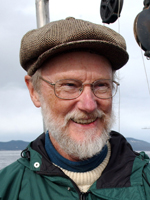
The Marshes at Dark Solstice
by Robert Coats
Bob lives in the watershed of Blackberry Creek, a small urbanized but partially-restored tributary of San Francisco Bay. He may also be found occasionally in the Tahoe basin, where he is studying the impacts of climate change.

Now come the cold fogs of winter
when a seamless nickel sky
presses on the marshes
like long-forgotten sorrow
and a pale disk of sun
barely shows through by noon.
At bay's edge cormorants
perch on rotting wharves
black wings outstretched and dripping.
Dunlins huddle against the cold,
bills beneath wings
awaiting the turning of the tide.
In such marshes by a distant northern sea
my ancestors plied sloughs in punts
snaring widgeons, trapping eels
then hunkered by peat fires in smoky huts,
bleary-eyed and dour, cursing the laird
while they waited for dawn.
Tonight I ply a scarlet river,
tail-lights stretching into the dark’s descent
but still hear the mudhen's cackle
tide's whisper, and soft
scuttle of scavenging crabs.
Tomorrow there’ll be solace
in the stalking grace of the egret,
ruby eye of the grebe,
falcon's stoop
and the clean southwest
wind of an oncoming storm.
© Robert Coats
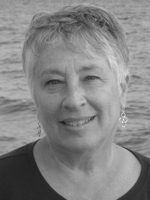
Bald Eagle
by Gail Thomas
Gail lives near the oxbow of the Connecticut River along a flight path for hawks, eagles and herons.

A sighting
is what we long for
when January wind
slices across the ice.
Long wings spread
straight as a knife,
white head lowered,
eyes hungry
for movement.
Along the shore, sweep
of feathers sounds
like forgiveness.
What was almost
lost nests here,
sins redeemed
in the counting.
© Gail Thomas

Driftwood
by Dan Jacoby
Dan's family has lived in Macoupin County, Illinois, for about 165 years. Western Mound has Bear, Lick, Hodges, and Solomon creeks emptying into Macoupin Creek which flows into the Illinois River and eventually into the Mississippi River just above Alton.

brace against this morning chill
some driftwood feeds my fire
on dry creek bank
bare from late fall flood
water is still, cold, deep, and dark
now in the fog
above the crackling fire
young man comes with plastic jugs
long lines attached to hooks
he will spend day fishing on the creek bottom
for mudcat and carp
he will soon be in prayer as
his weighted baited jars
float silently patiently
in the still world
i would greet him
surely he would sit
spell out weather wisdom
warm himself to foxfire lore
but I don't for some reason
moves on hands in heavy gloves
I return to myself as
wind plays havoc with the blaze
in minutes crows discover the fisherman
trees of full flapping magpie critics
will look over his shoulder all day
hoping he will drop some liver bait
having second thoughts, douse the fire
walk after him like a Buddhist
© Dan Jacoby

Early March
by Dan Jacoby
Dan's family has lived in Macoupin County, Illinois, for about 165 years. Western Mound has Bear, Lick, Hodges, and Solomon creeks emptying into Macoupin Creek which flows into the Illinois River and eventually into the Mississippi River just above Alton.

anyone who has dogs
has made that winter trek
just before bed
to feed and water
fighting razor cutting wind blown snow
broken busted water buckets
ice jack hammered open bottoms
kennel straw piled high
just noses showing
with the first thaws
come redwings, cowbirds
now competing with winter birds at the feeders
and as winds turn gentler
the odor of wet earth
goes anciently waking
capturing a whole primal sense
voice calling way into past
seamlessly bound psyche
whispering waltz under
fiery pit of timeless starlight
could one be
any more alive
© Dan Jacoby

Forsaken Fields
(a haiku sequence)
by William Cullen Jr.
Bill lives a half mile due south of Prospect Park, the site of the last indigenous forest in Brooklyn, New York City. Brooklyn, like the rest of the Big Apple, is served by the Catskill, Croton and Delaware watersheds located in southeastern upstate New York.

denuded scarecrow
the shadow of a long cross
at dusk in the drought
water use restrictions
she sprinkles her vegetables
with seltzer
heat lightning
glimpses of dusty fields
fill the farmer's dreams
thunder in the valley
only echoes of gunshots
putting down livestock
© William Cullen Jr.

Heavy Roses, France, 1914
by Carol Dorf
Carol lives between Strawberry Creek and Schoolhouse Creek where they pass on their way from the Berkeley hills into the San Francisco Bay.

A cluster of blown-out roses,
and by that I mean, roses
a moment past what we imagine
perfection, roses on the way
to fruit, the way a rosebush
will hold the bright red hips
all the way through winter,
resource for the birds, and other
wild things that share the garden.
Steichen's roses of the moment,
roses in black and white.
© Carol Dorf

Landscape Triptych
by Ron. Lavalette
Ron. lives in Vermont’s very northeastern corner, where the rivers flow north. The Barton River runs through his home town, joins with the Willoughby and empties into beautiful Lake Memphremagog.

1.
Wheeled glossy-wing'd and black
Corvus Cornix, Corvus Corax
to Home in golden Tamarack
this cold day in space & sad
when the sun goes down these hills
Merge here wood & water
inland, hillbound streams
dreaming driftwood beaches
along the forested seaboard;
merge green & grey the conifer
and elm stands, gazing, down
where fine white waterlace
fans flat rockface & falls
Melancholy in this mist land
The Raven and The Crow
2.
Two days back in Time
Birds, massing:
Put wing to Northland air you riveted,
strung out & Against the sky:
pull Winter in behind you
Like a vacuum:
going, and nowhere.
Somewhere trees reach, waiting.
Cornfields standing, left, amazed—
frost light'ning stalks & leaves
(where air has touched with ice
the leathered scarecrow's fame)
the stillness of the moment
Flight Flight
3.
Pinpoint: the Northern Star a sky away:
Winter on these hills
Where the eye looks
upward, nothing moves—
above the landscape
nothing is moving through
still air
Bare these treelimbs in extreme
starlight, frostbitten in air.
What sun there is
is cold
Still this greatcoated space
under white inches of muffle
Empty these skies
Part 1 was previously published in New Works Review.
© Ron. Lavalette

Love as Snow
by Lois Marie Harrod
Lois lives in the Stony Brook watershed in Hopewell, New Jersey, a sweet little town that has been here since the l8th century. Though close geographically, it seems far from the turnpike-oil-refinery New Jersey.

It must fall
It must cover
briar
and tree
devour
the shrunken pear
hide
the frightened sparrow
remake
the world wild
and shimmering
as it was
before
we came.
Previously published in Flyway: Journal of Writing and Environment
© Lois Marie Harrod
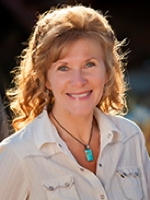
Love Poem Written In the Language of Western Wildflowers For Curtis
by Dianne Oberhansly
Dianne lives at the base of 13,000 foot Boulder Mountain, part of the Aquarius Plateau in southcentral Utah, which is mother to around 80 lakes. Her favorite, a day's hike from her house, is Crescent Lake.

My darling sandwort:
Our love is a two-seeded fruit
germinated on a newly-formed sandbar
in loose, warm soil.
We don’t need summer, good drainage
or propagation by wind. Just
sun and water and, in the distance,
winterfat and rosy everlasting.
I admit, loving you at first
was like wolfing the soil: I
could not get enough, could not tolerate
long summers or dry heat or overgrazing,
but slowly my bitterbrush edges softened
and I was frequented by bees.
Always, I wanted to be more
than your serviceberry or your mere
wild onion,
so I stayed near, a fleshy red-orange,
edible but tart. Years
went by, sweet biscuit root,
liliaceous lover, and I waited
for you to see the delicately veined
leaves of our future.
Some say love is a false
dandelion, some that it is too easily
transplanted, but after all this time,
my sweet vetch, the sepals
have fused, our upper foliage turned
pink with age, and our rootstalk
grown thick,
so I know that love
can extend beyond the rocky ridges,
beyond the freezing zone, can be
ground into a fine, powdery grain
and eaten to survive.
© Dianne Oberhansly
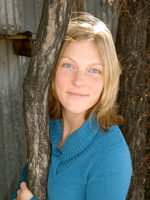
Palace of Unfinished Glass
Ice Climbing, Finley Creek
by Clara Quinlan
Clara lives in the Front Range of the Rocky Mountains, where Longs Peak looms in the near distance and Coal Creek cuts dramatically across the land.

Given to the lead smudges of trees,
capped in a struggling river,
white, like a sponge,
collecting a bit of rock here and there, sucking
our limbs, parasite of the secret moon
as ghost. Into the far rebel pieces of cloud,
we advance;
lush sound, snow
collapses, trees shoot down their stars,
curtaining our view like splotches
on an old photo, when this glass fortress
was never ours, never asked
for our arrival,
crampons gnashing the glacier’s crust,
packs crossed in hammer and adze, beak-nosed, and above,
mountain spring stunned into icicles
like baleen raked from a mouth,
wind wheedles through
wind, scarleting cheeks, chutes of alder
crimson against our backs
as strung from the ice-sapped rope
we ascend this barricade, each limb a wing, jacketed blade
pinwheeling into
dimples, depressions, irregular dents,
up the rippling throat of ice, hammering,
would that we advance
bright and boundless
as the metal cranes of axes pocket the face, spate of scars,
screws splintering spider webs white
beneath ice’s surface, glacial milk, bleached sun
snow expanding like the sea
and even breath has silhouette,
water charming just below the planked river
as we search for what’s good:
green ice, sea blue,
iridescent scales crowding up,
haunches of deer
flashing, snow-clutched
to the knees –
at home, the dog’s water bowl
quartzed, porch door stitched in glaze –
under the impression this mirrored dome
is on the side we climb on,
loom of ice like a ship’s hull
we might reel in or
liquid baptismal reaching past the clouds or
cosmic bits, lucent shields, ice so vast
it is a ballroom, what can we
compass this into.
© Clara Quinlan

Sangre de Bolivia
by Lauren Lockhart
Lauren lives on the eastern side of the Colorado Rocky Mountains in the South Platte River watershed.

River-blood curls
her back into earth-flesh
heavy with red from the slaughterhouse
five miles south
her surface offers shiny spots of oil and
hospital leftovers from
three miles west-
here is where the flesh of us
is confused for the flesh of cattle.
Poison river, life-blood turning,
the children carry buckets of her home.
dark and rotting water
but Thirst will rob you of your lips
if you let him stay too long.
.
From the east,
an offering of noxious industry
vomiting fulvous sour malice into her mouth, the river
swallows and swallows and swallows and
her people gather like a flood in the city
screaming to the north
for their right to belong to her, and her to them
their life
quivering, the river
sangre de Bolivia clots sticky, infected and blistering
while the money pollinates,
while the taps run dry.
© Lauren Lockhart
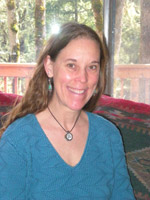
Stories of the Black Ware Seed Jar
—after a seed jar created by R. Diane Martinez
by Carter McKenzie
Carter lives in the foothills of western Oregon’s Cascade Mountains in the Middle Fork Willamette watershed near Lost Creek.

I have been through fire.
My form is fixed,
smoke-dark,
patterns of wing,
beak, thunder, and eye,
the storm of birds
chasing each other,
energies of life.
My small mouth
is starred,
cool and dry,
remembering
seeds
of potential.
Burnished
with stone,
I recall patience
through winter,
through wind,
through the rains
that fill the arroyos.
I absorb, hold
what stirs, rattles
like prayers,
like snakes,
awaiting release until
they pour my gifts
into the field again,
what you imagine—
where I began,
seed after seed,
fire becoming
field,
blossom and grain
and all of the voices
therein.
© Carter McKenzie

The Seasons Persephone Promised
--AnnieFinch
by Linda Benninghoff
Linda lives in the Northern Long Island Watershed in back of Caumsett State Park and less than a mile from the Long Island Sound.

A winter like no other,
the gray fangs of snow in the street
as you leave me,
going in your green khaki coat
out the door and to the train,
home to your family.
Easter comes early this year.
I go out to dinner with my parents,
but the spring seems underground.
There are a few green forsythia vines,
but the season will not come till later on,
and the goddess will not dance madly
as she once did, to see the earth change
as she returns to it.
Once even the dandelions
were flowers to me,
but now the spring does not come easily,
though I have the taste of buds
jealous for the heavy summer
on my lips,
and the big-bellied robin
sings of years ago,
when she pressed forward,
her beak open for song
of the crudeness of branches,
of lilac bushes opening their stiff buds
like fingers,
into those seasons Persephone promised.
© Linda Benninghoff

To Exxon
by Timothy Pilgrim
Timothy lives in the far northwest corner of the United States -- the Strait of Georgia Watershed -- at Bellingham, Washington.

You brought new meaning
to robber baron,
taught us how to stare
cold as breath on Tundra,
to pump frozen sod primed with promises
even Arctic fox knew
were lies. Your sleek mukluks
gave you away. Told us
pipeline, tankers,
your attorneys slapping our backs in bars,
buying free drinks,
offering prosperity,
sadness
even glaciers couldn't scrub
away. We followed
your flowing tracks,
our backs to the rising sun,
itself giving way to night.
We tromped black ice,
piled oily otters, seals, terns
cheek-high. Set them ablaze,
watched the pyre
outshine frosty dusk.
Our breath froze white
on the darkened beach. That night
we burned ice to stay warm.
Timothy Pilgrim
First published by Trestle Creek Review
© Timothy Pilgrim

Winter Light
by Barbara Crooker
Barbara recently moved to an apartment in a retirement community in rural northeastern Pennsylvania facing wetlands and the Little Cedar Creek.

It's a milkiness poured from
a great glass bottle,
a carafe of blanc de blanc, iced,
a light shot with pale gold,
opalescent blue,
the distillation of pearl . . . .
In this icy light, the ghostly fronds
of ice ferns cover the glass,
as the sky descends,
erasing first the far blue hills,
the cornfield hatch-marked with stubble,
coming to our street-
the sky flinging itself
down to the ground.
And the earth, like a feather bed,
accumulates layer on layer. . . .
The snow bees are released from their hive,
jive and jitter, sting at the blinds.
Down here, under this glazed china cup,
the minor fracas of our little lives
is still under the falling flakes.
And the great abalone shell of the sky
contains us, bits of muscle, tiny mollusks.
These winter nights
are never black and dense,
but white, starlight
dancing off the land.
And then the luminous dawns,
the pearled skies full of hope
no matter what else we know.
First published in Yarrow
© Barbara Crooker

Zoo
by Peggy Trojan
Peggy lives next to a trout stream called Rocky Run in the north woods of Wisconsin.

We live in a cage
of our making
while round and round us
go the menagerie of natives
at their leisurely pace.
We look out, following
from window to window.
Common deer, crow or eagle,
coyote, bear, rabbit,
rare blue heron or fisher.
We watch them stroll
on their quiet carousel.
Now and then they freeze,
return our stare,
ears twitching, eyes unblinking,
assessing the danger
if we were to get loose.
© Peggy Trojan